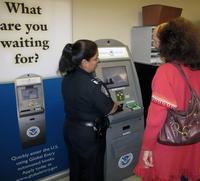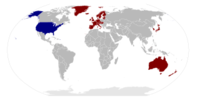-
Residents of six Real ID-noncompliant states to face restrictions
Massachusetts is one of the six states whose residents are unable to enter restricted parts of federal buildings without another identification card, such as a passport. The REAL ID measure requires states to verify citizenship and update security standards when issuing licenses. Officials in Massachusetts, Maine, Oklahoma, Alaska, Arizona, and Louisiana say that the REAL ID program will cost millions and that it raises privacy concerns and infringes on state’ rights.
-
-
Photo-ID security checks flawed: Study
Passport issuing officers are no better at identifying whether someone is holding a fake passport photo than the average person, new research has revealed. A pioneering study of Australian passport office staff revealed a 15 percent error rate in matching the person to the passport photo they were displaying. In real life this degree of inaccuracy would correspond to the admittance of several thousand travelers bearing fake passports.
-
-
Arizona voted against complying with Real ID, and state residents now face the consequences
In 2008, Arizona lawmakers passed a bill (HB 2677), signed by then-Governor Janet Napolitano, prohibiting the state from complying with the Real ID Act. Limits on people without a Real ID-compliant driver’s license, such as no access to federal facilities, will be phased in in three stages – 21 April 2014, 21 July 2014, and 19 January 2015. Those who do not have a Real ID will need a passport, a second form of identification, or an “enhanced” driver’s license.
-
-
Economic relationships, not terrorism fears, drive visa decisions: study
Despite heightened focus on preventing global terrorism since the 9/11 attacks in 2001, researchers have found that the economic relationship between two countries is the most significant factor in determining the acceptance or rejection rate of visas. “Surprisingly what I find is the global reputation a state garners as a prominent origin of terrorism has a very minute impact when you take into account trade interdependence,” the study’s author says.
-
-
DHS wants changes in Calif.’s ID for undocumented immigrants
California is preparing to issue drivers’ licenses to undocumented immigrants who have been permitted to stay in the United States, but DHS has rejected the state’s design for the license card. DHS wants the cards to be unique enough to distinguish them from regular drivers’ licenses, but immigrant rights activists do not want the design to be so different that license holders would suffer from discrimination.
-
-
The global passport security loophole: how serious is it?
More than one billion people are estimated to have travelled internationally in 2013, according to the UN’s World Tourism Organization. The International Civil Aviation Organization (ICAO), a United Nations body that regulates air transport worldwide, reported that around 3.1 billion people travelled by airplane in 2013. The numbers are immense. As a result, so too are the security challenges for airlines, immigration, and airport security agencies. The ICAO expects all of its 192 member countries to introduce machine-readable passports by 2015, but there is still no international deadline for the introduction of biometric passports. This means some people could be using old-fashioned passports until 2025. Even then, there is no absolute guarantee biometric passports are any more tamper-proof than a host of other computer-based security measures which apply to credit cards and customer databases.
-
-
Passports of millions of travelers to U.K. not thoroughly checked
The use of false passports by two passengers on Malaysia Airlines flight MH370 which disappeared a couple of days ago have highlighted the fact that in the United Kingdom, the passport details of more than twenty million people entering and leaving the United Kingdom every year are not being properly checked. The Home Office’s most recent figures show that data is still not being collected and examined for about 10 percent of the 200 million people flying in and out of the United Kingdom every year.
-
-
Mississippi to comply with REAL ID
Last Friday, Mississippi joined forty other states and announced it would comply with the REAL ID Act. Forty-one states and territories are fully or partially compliant with REAL ID – of which twenty states are fully compliant.
-
-
Corrupt practices: U.S. visa-granting easily compromised
While serving as a Foreign Service Officer in Guyana, Thomas Carroll sold visas to anyone who would pay, making millions of dollars in the process. Carroll’s scheme differed from the petty favors and kick-backs, which had typified FSO visa fraud in other embassies and consulates, mostly in scale. He took retail visa fraud and made it wholesale.
-
-
California granting driver's licenses to illegal aliens threatens homeland security: critics
Last Thursday night’s approval of AB 60 by both houses of the California Legislature, granting driver’s licenses to illegal aliens, poses a serious threat to the security of all Americans, critics charge. The critics say that in 2005, in response to recommendations by the 9/11 Commission, Congress enacted the REAL ID Act in order to discourage state governments from issuing driver’s licenses and other identity documents to illegal aliens – and that California’s AB 60 is designed to circumvent requirements of REAL ID Act.
-
-
TSA to promote PreCheck program for travelers
In an effort to make airport security lines shorter and move faster, the Transportation Security Administration (TSA) will allow passengers to apply for expedited airport screenings. TSA says the plan is for 25 percent of U.S. travelers to be eligible for the system by the end of this year, and 50 percent by 2014.
-
-
Idaho joins program connecting DMV information to E-Verify
Idaho became the third state to join the Records and Information from DMV’s for E-Verify (RIDE) program on Sunday. The other two states are Mississippi and Florida. RIDE automates motor vehicle document verification between Motor Vehicle Agencies (MVAs) and the United States Citizenship and Immigration Services (USCIS).
-
-
New program whisks passengers through airport security

A new system has been introduced to get passengers through airport security faster. The program, called Global Entry, was developed by the Customs and Border Patrol (CBP) and it offers a new way to avoid customs and immigration lines.
-
-
Lawmakers want to ease travel to U.S. as part of immigration legislation

A bi-partisan group of House lawmakers is working to include a provision in the House immigration legislation which will make it easier to travel to the United States. Travel industry groups support the effort, having fought for years to get the government to relax security measures. The industry has argued that these measures have turned off many foreigners from traveling to the United States.
-
-
HID Global selected as prime contractor for USCIS Green Card
Irvine, California-based HID Global the other day announced the U.S. Citizenship and Immigration Services (USCIS), an agency of the U.S. Department of Homeland Security, has selected the company as the prime contractor for the USCIS Permanent Resident Card, commonly known as the Green Card.
-
- All
- Regional
- Water
- Biometrics
- Borders/Immig
- Business
- Cybersecurity
- Detection
- Disasters
- Government
- Infrastructure
- International
- Public health
- Public Safety
- Communication interoperabillity
- Emergency services
- Emergency medical services
- Fire
- First response
- IEDs
- Law Enforcement
- Law Enforcement Technology
- Military technology
- Nonlethal weapons
- Nuclear weapons
- Personal protection equipment
- Police
- Notification /alert systems
- Situational awareness
- Weapons systems
- Sci-Tech
- Sector Reports
- Surveillance
- Transportation
Advertising & Marketing: advertise@newswirepubs.com
Editorial: editor@newswirepubs.com
General: info@newswirepubs.com
2010-2011 © News Wire Publications, LLC News Wire Publications, LLC
220 Old Country Road | Suite 200 | Mineola | New York | 11501
Permissions and Policies
Editorial: editor@newswirepubs.com
General: info@newswirepubs.com
2010-2011 © News Wire Publications, LLC News Wire Publications, LLC
220 Old Country Road | Suite 200 | Mineola | New York | 11501
Permissions and Policies
